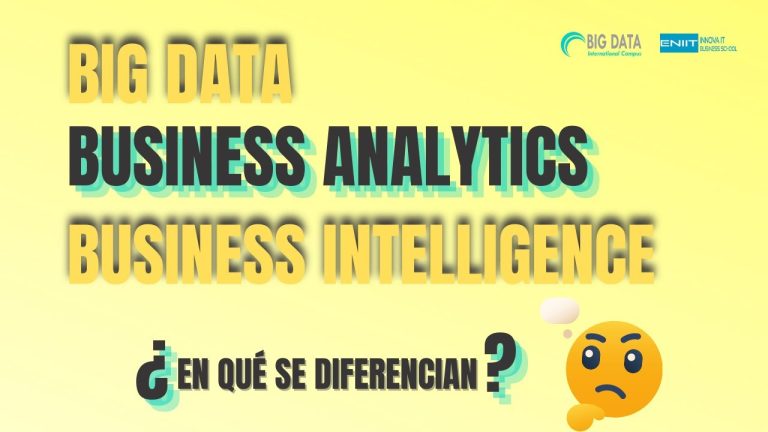Contenidos
Business intelligence y big data
Difference between business intelligence and big data
What can we expect from a solution like Business Intelligence (BI) and Big Data? BI or Business Intelligence software helps companies make decisions based on data and metrics, but what can we expect? What does Big Data have to do with it? In this post we will review the definition of both concepts and their differences.
Business Intelligence is the ability to visualize data in an easily interpretable way based on indicators represented with graphic resources, with a powerful top-down navigation that makes it easy to get to the source of the detected problem. If we associate it directly to information technologies, we can affirm that BI is the set of applications, technologies and methodologies capable of gathering and transforming data into valuable and structured information to be used and analyzed directly. In this way, information is converted into valuable data for decision making.
The comparison between these concepts is like talking about two worlds yet to be explored, but which constitute the closest reality to companies. Both allow the value of information to be extracted in a totally different but complementary way. BI is a set of business management techniques that allow companies to make decisions based on data, and Big Data, on the other hand, are the tools capable of obtaining, storing and processing data.
Big data, big analytics…
La inteligencia empresarial, en términos sencillos, es el conjunto de sistemas, software y productos que pueden importar grandes flujos de datos y utilizarlos para generar información significativa que apunte al caso de uso o escenario específico.
Big data es la palabra que más suena en los negocios. El Big Data está cambiando nuestro día a día en los negocios. Todo el mundo piensa que el Big Data no es más que una cantidad masiva de datos. Pero en realidad no es sólo una cantidad masiva de datos, también se trata de la estructura de los datos, el procesamiento de los datos con el fin de ofrecer un valor añadido a la organización.
El objetivo de la inteligencia empresarial es ayudar a la empresa a tomar mejores decisiones. La inteligencia empresarial ayuda a elaborar informes precisos extrayendo la información directamente de la fuente de datos.
Big data y business intelligence ppt
La inteligencia empresarial transforma los datos en información procesable. Ayuda a optimizar las decisiones estratégicas y tácticas de las organizaciones utilizando las aplicaciones, la infraestructura y las herramientas, así como las mejores prácticas que facilitan el acceso a los hechos y cifras operativas de una organización. La minería de datos es el proceso de evaluación de los patrones no reconocidos en los conjuntos de datos en bruto de gran tamaño, según las diferentes perspectivas para categorizar los datos en información útil que resulta en la obtención de conocimientos empresariales para resolver problemas de antemano.
En lenguaje llano, la Inteligencia de Negocio analizará los complejos datos brutos de una organización y los transformará en información útil según las necesidades de la empresa. Utilizando esta información útil, la empresa sabrá qué está funcionando, qué no, cuál es el futuro y cómo puede mejorar su negocio.
Hay un océano de datos disponibles en una organización. Los datos no tienen valor hasta que se convierten en información valiosa. Es necesario analizar estos datos y convertirlos en información valiosa. Por lo tanto, la Minería de Datos ayudará a extraer esta información valiosa de los enormes conjuntos de datos disponibles. Los otros procesos involucrados en la Minería de Datos son:
Big data: a revolution that will t…
Big Data and Business Intelligence allow the business to extract value from information, but they do so in different ways that complement each other. Thus, BI seeks to delve into the data sets available to the organization. The way to obtain knowledge through business intelligence processes is as follows:
If big data can draw on the analysis of information contained in a data lake, business intelligence will likely use a data warehouse. The difference between innovation and discovery vs. queries and answers best describes the main point of divergence between Big Data and Business Intelligence.
But Big Data allows you to look into the future and focus on details that, at first glance, might seem less relevant, but end up proving to be a source of great opportunities. Of course, this requires an analysis that, in some cases, is only available to specialized technical personnel, such as data scientists or big data analysts; unlike the requirements imposed by BI, which are much less demanding and democratize knowledge in the organization, by putting it in the hands of all business users.

